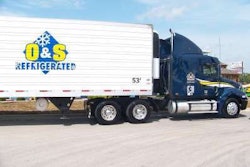The truck productivity debate must address safety worries
For years, the estate tax was known mostly as the inheritance tax, which conjured up images of spoiled rich kids and money they didn’t really deserve. There wasn’t much middle-class political support for eliminating the tax.
By the mid-1990s, however, Republicans had brilliantly seized upon the term “death tax.” Mean ol’ Uncle Sam was hovering over dying entrepreneurs and family farmers, waiting to snatch a huge chunk of their assets from grieving loved ones. By shifting the focus from the recipient to the giver, reformers completely transformed the debate. Soon, people who never could dream to accumulate enough wealth to trigger the tax were outraged at the injustice of taxing death.
Words matter, and that’s why “truck size and weight” – a standard term of reference for decades – is now “truck productivity.” The old phrase brought to mind one thing – bigger trucks barreling down the highway. Why should the average person support that?
Truck productivity doesn’t really get the job done, however. While the phrase doesn’t invite people to picture big rigs sporting obnoxious teeth on their grilles, it also doesn’t give them a reason to care either. The principal beneficiaries of truck productivity are shippers, private fleets and, debatably, trucking companies. Since it’s hard to prove that more productive trucks would mean lower prices for food and other goods, Americans really have no reason to want them.
Enter climate change and other sustainability challenges, such as dependence on foreign oil. While nobody would invite the dire consequences of depleted environmental and energy resources, there are upsides for fleet owners, such as government support for technology that lowers fuel consumption and, yes, the opportunity for bigger payloads. Facing increasing likelihood of government regulation of greenhouse gases, the American Trucking Associations launched a sustainability initiative a year ago under the banner Trucks Deliver a Cleaner Tomorrow (www.trucksdeliver.org). Key elements of ATA’s proposal include tighter speed limits, idle reduction, fuel economy standards for trucks, congestion relief and more productive truck combinations.
As the next highway bill advances in Congress, all of these elements will come into play, but trucking will have to fight for pro-environment recognition. Railroads have been pushing the environmental theme for several years. CSX has been particularly aggressive and creative with its television, radio and print ads discussing the 280 trucks a train supposedly takes off the road and the 423 miles, 436 miles or however many miles this week a CSX train can carry a ton of freight on a gallon of fuel.
The federal government itself supports bigger trucks, at least implicitly. The U.S. Environmental Protection Agency’s SmartWay Transport Partnership next year plans to roll out what it calls “SmartWay 2.0.” The linchpin of SmartWay 2.0 is consideration of not just the total amount of fuel saved and carbon dioxide (CO2) eliminated but also of the grams of CO2 emitted per unit of freight hauled. Recognizing the differences in freight profiles among fleets and modes, SmartWay 2.0 will consider CO2 emissions for every average payload ton-mile or volume-mile. By those metrics, a 97,000-pound tractor-trailer combination clearly is preferable to an 80,000-pound combo, and a longer combination vehicle is better than a single trailer.
The environmental argument is key, but it won’t win the day by itself. The disdain for large trucks is so great that lawmakers will need political cover on the issue of safety. Bigger trucks mean fewer trucks and reduced risk exposure, but statistical arguments probably won’t be enough. The tradeoff for greater productivity might be a combination of safety technology mandates and tighter driver training and experience standards.
With some comfort in the safety of larger trucks, perhaps one day Americans will consider a truck combo that weighs just 80,000 pounds as environmentally unfriendly. But that’s hardly as sure as either death or taxes.










